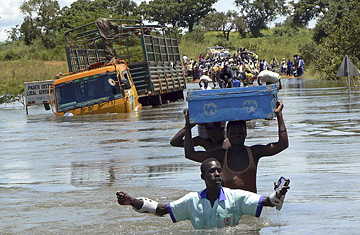
Ugandans cross a flooded bridge connecting Lira, Pader and Kitgum as their vehicles failed to cross the river in northern Uganda.
Africa has always been predicted to be the continent that will be worst hit by global warming and climate change. Could those predictions be coming true? Extreme rains and floods have made for a very wet summer in Africa, and there is no end in sight to the downpours that are swallowing towns and forcing over a million to flee their homes in at least 20 countries. Since June, Uganda, Sudan, Ethiopia and Kenya have had hundreds of thousands of people uprooted from their homes. Scores have died since. West Africa has seen its worst floods in years, with 300,000 fleeing the earth-colored waters of northern Ghana. Meanwhile, forecasts by African meteorologists say the rains have yet to peak. October may be the worst month to come in this very wet year.
"This weather is what climatologists predicted, and it is happening even faster than expected," says Grace Akumu, executive director of the Kenya-based Climate Change Network. "We are overwhelmed." The immediate consequences of climate change in Africa? Countries will experience either torrential floods or severe drought during a season. Akumu says that the unpredictable climate will threaten the food supply in Africa and potentially eliminate key crops. Africans are expected to face a severe lack of food and drinkable water by the end of the century.
Scientists on the U.N.'s Intergovernmental Panel on Climate Change warned this week that the effects of global warming are already being felt in Africa. The IPCC's most recent report on Africa predicted a minimum 2.5 degree centigrade increase in the continent's temperature by 2030. Growing seasons will be cut short and stretches of land made unsuitable for agriculture, with yields declining by as much as 50% in some countries. In sub-Saharan Africa, between 25% and 40% of animals in national parks may become endangered. Africa's major bodies of water, including the Nile, will suffer excessive flooding caused by rising sea levels.
Africa is particularly vulnerable because it has a low institutional capacity to combat the changing weather. As a result, says Ugandan climate change specialist James Magezi-Akiiki, "in Africa, adaptation to climate change is more important than mitigation." In response to the floods devouring Uganda, Magezi-Akiiki says that the government will now consider the effects of global warming, such as increased rainfall, in its planning of future infrastructure projects. Ironically, Africa produces far less carbon than other continents, leading some scientists to blame industrialized countries for Africa's climate plight. Uganda's President Yoweri Museveni announced at an African Union summit this year that developed countries were "committing aggression" against Africa by causing global warming.
"There's not much Africa can do — unless other countries cut their greenhouse emissions, our efforts will be undercut," Akumu says. In the meantime, floods, droughts, earthquakes, landslides and other natural disasters are expected to become more frequent, along with the occurrence of diseases such as typhoid, cholera and malaria. Akumu warns that without aid from richer countries in the form of cash to pay for more durable roads and hospitals, Africa will be unable to handle more disasters like this summer's.
